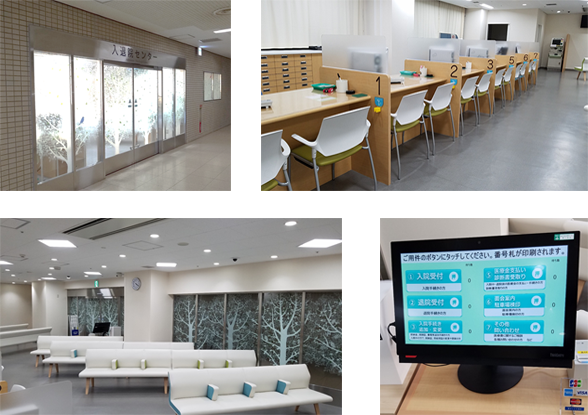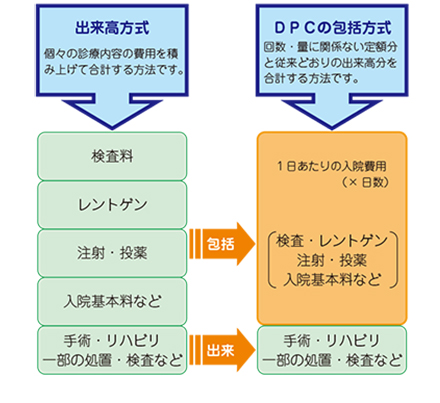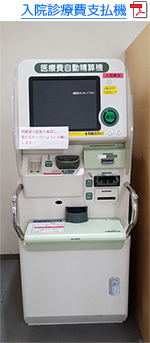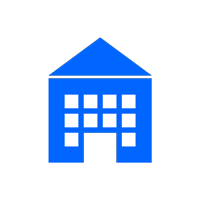![]()
Hospitalization
Admission Procedures(Admission / Discharge Center, 1st floor, Main Building )
On your first day of admission to the hospital, once you have received medical care at each department and your hospitalization has been decided, please proceed to the Admission/Discharge Center (inpatient and outpatient reception) on the 1st floor.

- Additional Things to Bring
-
- Hospitalization Pledge
- Request for Renting Hospital Gown
- Health Insurance Card (Certificates for those using workmen's accident compensation insurance and various other financial assistance)
*Please note that the medical treatment fee is not covered if you do not submit your health insurance card. - ID Card

- Seal (official seals which need a red inkpad)
- Discharge Certificate (if transferred by another clinic)
- Deposit (credit cards are not accepted)
- 50,000 Yen・・・Advanced Elderly Medical Care, Elderly Recipient Certificate, Various Public Expense, Workmen’s Accident Compensation Insurance
- 150,000 Yen・・・Insurance premiums 20% and 30%
- 250,000 Yen・・・Childbirth, In-vitro Fertilization, Own Expense, Traffic Accidents, etc.
*Under public assistance is not required.
- The deposit certificate is to be paid at the time of discharge, so please keep it in a safe place.
- Be aware in advance that there may be cases when it is not possible to be admitted immediately, due to the availability of the hospital rooms.
- If you have been hospitalized without the normal procedures, such as with an emergency or unavoidable circumstance, please complete the admission procedure as soon as possible.
- The admission agreement required for the hospitalization process and the hospitalization procedure documents, such as the request for use of a hospital gown, are available at the Admission / Discharge Center on the first floor of the main building.
Additional Things to Bring
Daily Necessities: Toiletries (toothbrush, toothpaste, shaver, towel, etc.), bath towel, soap, shampoo, teacup or spout cup, slippers (slippers should have rubber soles), tissues, wet wipes, and underwear, etc.
- Other things as directed by your doctor or nurse which are necessary for your treatment or examination.
- Please do not bring valuable items or a large amount of cash as a protection against theft.
- You can purchase daily necessities at ourKiosk.
Bedding and Hospital Gowns
- Your bedding is provided by the hospital.
- For sanitation and ease of medical treatment, we provide hospital gowns at a cost of 100 Yen per day. (excluding tax) (own expense). If you bring your own gown, please use one that opens in front, like those we use at our hospital. (We do not wash personal gowns here.)
- We wash and change the bedding and hospital gowns here.
Attendant
- An attendant will not be necessary, in principle. If you desire to have an attendant, due to your medical condition, please consult with your primary doctor or a chief nurse.
Visitation Rules: Patients should inform their visitors
- Visiting Hours
| Monday - Friday (Weekdays) | Saturday, Sunday and Holidays | |
| General Ward | 1:00 p.m-7:00 p.m | 11:00 a.m-7:00 p.m |
*Visiting hours differ depending on the ward.
For Visiting
- Intensive care units and neonatal wards such as the Emergency and Critical Care Medical Center, ICUs, NICUs, and neonatal wards do not allow visitors other than family.
- Visitors may visit only with the permission of the nurse.
In addition, keep visits short so that they do not bother the patient and the roommate. - The visiting time may be limited or refused, based on the wishes of the patient.
- Avoid visiting if you have symptoms such as fever, cough or diarrhea. As a rule, we restrict the following people from visiting, to prevent the spread of infections in the hospital.
- Elementary school children (12 years and under)
There is a high risk of bringing epidemic viral diseases (measles, rubella, mumps, chickenpox, influenza, etc.) to the hospital. However, if you would in any case still like to visit us, and if you consult with each department (ward), we will respond according to the situation. - Those who are suffering from fever, diarrhea, vomiting, epidemic viral diseases, etc, even if they are junior high school students or older. The visitation is possible if the following conditions are met.
- Fever, diarrhea, vomiting ⇒ symptoms disappear and become normal
- Endemic viral diseases
- Elementary school children (12 years and under)
- Influenza:
- 2 days after the fever and 5 days after the symptoms
- Measles:
- Three days after the fever
- Rubella:
- All the rash has disappeared
- Mumps:
- After five days of swelling of the parotid gland, mandibular glands or tongue under the mouth, and until the whole-body condition is good
- Chickenpox:
- Until all the blisters are crusted
- Smoking is strictly prohibited in hospitals and in hospital rooms.
- Eating and drinking are generally prohibited in the hospital.
- Only bring food and drink to the patient after obtaining the permission of the doctor/nurse.
In addition, please refrain from sharing food and drink with other patients, because there are cases where there are meal restrictions, etc. - We also have patients with allergies, so please refrain from bringing flowers.
- We have an imprinted hand sanitizer in front of each patient room, so please disinfect your hands at the time of visitation.
- Do not sit on the patient's bed or sit on the floor.
- Contact the hospital if you do not wish to have guidance for visitors.
- Please note that we do not answer inquiries about hospitalizations, discharges, and medical conditions over the telephone in order to protect the privacy of patients.
Information about medications that we would like our patients to provide
When a patient is admitted, the pharmacist will ask them to confirm the medicines they have brought. Please provide the following information for safe and secure drug therapy.
- Current medications and injections you are taking, or health foods, etc.
◊ If you have any remaining medications at home, bring them with you. (Please take the required medications.)
◊ Please bring a Medication Record Book if you have one. - Side effects and allergies you've experienced so far
- If you have felt ill from taking medicine
(We may be able to discover the side effects of the medication, depending on the patient's complaint.)
The pharmacist will explain the medications. Please ask the pharmacist if you have any concerns about the medications.
If you are likely to run out of a medicine that was prescribed by another hospital during the hospitalization period, you should consult with a doctor, nurse, or the ward pharmacist, etc. We will prescribe this in our hospital when it is possible. In addition, be sure to contact your doctor before going out to visit to another hospital (for treatment, examination, etc.). (We will provide you with a treatment communication form and a medical information form.)
Hospitalization Medical Expenses
The hospital charges are based on a medical system called "Comprehensive Evaluation Method (DPC/PDPS)" designated by the Ministry of Health and Welfare.
DPC/PDPS (Diagnosis procedure combination/per diem payment system), unlike the "volume method" calculated for each conventional medical practice, is based on the disease and symptoms of hospitalized patients / therapeutic action. This is a new calculation method that combines the comprehensive valuation portion (hospitalization fee, examination, medication, injection, etc.) and the volume evaluation part (surgery, anesthesia, rehabilitation, guidance fee, etc.) and consisting of an amount per day for each classification (diagnostic group classification) prescribed by the Ministry of Health.

About the payment machine for inpatient medical expenses

The hospital will send an invoice for the hospitalization medical fee to the hospital room on the 10th of the following month with closing at the end of each month. Payment must be made by the 25th at the payment machine for inpatient medical expenses (for a regular invoice only) or at the Admission / Discharge Center on the 1st floor of the main building.
We ask that you use the payment machine to alleviate congestion at the window.
*The receipt will not be reissued, so please keep it in a safe place.
Location of the payment machine for inpatient medical expenses
Admission / Discharge Center... Hours 9:00 - 17:00
You can use a credit card to pay your medical bills. (A PIN number is required when using the payment machine.)

Accepted cards
VISA、MasterCard、JCB、AMERICAN EXPRESS、Diners Club
About the statement
We issue a free statement of the calculation items for the individual medical fees when issuing receipts, in order to actively promote transparency in medical care and providing information.
The statement lists the names of the drugs used and the names of the examinations performed. Contact the accounting office if you do not want this statement issued, including when a family member does the accounting on your behalf.
About insurance card confirmation
The health insurance card and cards for recipients of various public expenses will be confirmed periodically during the hospital stay and the discharge procedure, so you should present these to the Admission / Discharge Center.
In addition, if there is a change of insurance or renewal of the validity period, etc, due to moving or changing jobs, please present your new insurance card and beneficiary ID to the office as soon as possible.
Discharge
About the discharge process
- Payment for inpatient medical expenses is done on the Admission / Discharge Center on the first floor of the main building on the day of discharge.
What you need to bring- Insurance card
- Seal (official seal, uses a red ink pad)
- Prepayment of deposit certificate
- Payment will be made for your medical expenses up to the day of discharge. (At that time, we will refund the deposit.) Ask the ward nurse about the total expenses due for your hospitalization / for your treatment in the hospital.
Note
Requests at the time of admission
- Be sure to observe the medical instructions from the doctor, nurse, pharmacist, etc.
- We ask that you comply with necessary manners and rules to maintain a quiet recuperative environment.
- Follow the instructions of the doctor and the nurse regarding exercise, bathing, going out, or staying out during hospitalization, and do these only after obtaining permission.
- Follow the guidance of the hospital officials in the event of a disaster.
- Do not enter places other than those necessary because there are hazardous and off-limits areas in the hospital.
- Smoking is prohibited on the premises.
- Cooperate with fire prevention by paying special attention to fire safety.
- Please feel free to consult your doctor, nurse or medical social worker if you would like to be treated with public expenditures.
- The lights-out time for the ward is 21:00. All patients should rest after that time, because activity can cause problems for other patients.
- A convenience store is located on the 2nd floor of the main building. The hours are from 7:30 - 19:00. (Sundays and National Holidays 10:00 - 19:00) There is also a 24-hour convenience store on campus.
- A drugstore is located on the 1st floor of the main building. The hours are from 9:00 - 17:00. (Closed on Sundays, National Holidays and New Year holidays.)
- Please refrain from using the parking lot during your hospitalization period. (A parking fee (general public) will accrue).
- You will be discharged if you do not follow the instructions from the doctor, the nurse, etc., in the medical treatment or if your behavior becomes troublesome to others. We will report any acts of violence to the relevant agency and we will deal with it strictly in accordance with the law.
Use of mobile phones and PHS
Please turn off your mobile phone while in the hospital.
This is because medical equipment may be used in the hospital room, and patients with medical equipment may be moving in the corridors. (Use mobile phones only in designated locations).
Do not bring your mobile phone to the Department of Emergency and Critical Care Medicine, an operating room, or an intensive care unit room (ICU).
Phones must be turned off when medical equipment is being used outside the ward, such as near the lobby, the waiting room, or in the hallway.
This is because the precision medical equipment might malfunction due to the radio waves emitted by the mobile phone.
Cardiac pacemakers
Please pay sufficient attention to this.
Attention: An implanted cardiac pacemaker may be affected by the radio waves when some cell phones are used near it. However, there is no concern with electromagnetic interference from the hospital PHS used by the medical staff.

Other requests
We do not answer inquiries about hospitalizations, discharges, and medical conditions over the telephone in order to protect the privacy of patients.
Important notes:
We are not responsible for items left in the hospital room.
Note:
Please note that if you commit the following acts in the hospital, you will face a forced discharge and have to leave.
- If you use violence towards hospital staff (doctors, nurses, etc.) or other patients, or there is a threat of violence
- If you are a nuisance or harass a hospital employee or other patient, or if you interfere with the work of a hospital employee verbally or with abusive behavior
- If you commit an act of sexual harassment, such as inappropriately touching a hospital staff member or using obscene language
- If you make an improper request to the hospital staff
- If you damage the equipment, fixtures, facilities, etc. in the hospital
- If you continue to behave inappropriately, despite warnings from the staff, when your behavior interferes with hospital operations.

Questions related to admissions
Admission / Discharge Center, 1st floor, Main Building
Service hours 9:00 - 17:00
Tel.049-228-3409




